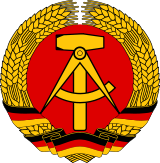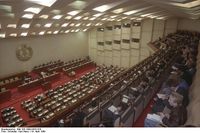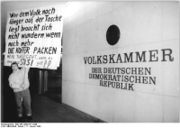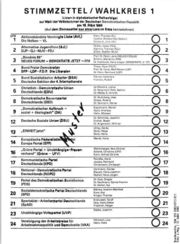People's Chamber
| People's Chamber Volkskammer |
|
|---|---|
 |
|
| Type | |
| Type | unicameral parliament (until 1958 lower chamber) |
| Timeline | |
| Country | German Democratic Republic (East Germany) |
| Established | 1949 |
| Preceded by | Reichstag |
| Succeeded by | Bundestag |
| Disbanded | 1990 |
| Members | 400 |
| Meeting place | |
 |
|
| Palast der Republik | |
The People's Chamber (German: Volkskammer) was the unicameral legislature of the German Democratic Republic (East Germany). From its founding in 1949 until the first free elections on 18 March 1990, all members of the Volkskammer were elected on a slate controlled by the Socialist Unity Party of Germany (SED), called the National Front. Despite the appearance of a multi-party system, all opposition parties were effectively controlled by the dominant SED . In addition, seats were also allocated to various mass organizations affiliated with the SED, such as the Free German Youth.
Initially, it existed alongside the Chamber of States, but in 1952 the states of East Germany (and with it the chamber) were dissolved.
In theory, the Volkskammer was the central political body of the GDR, appointing the Council of State (after 1960), the Council of Ministers, and the National Defence Council. However, parties were expected to respect democratic centralism, and the most dissent in voting ever shown by the Volkskammer to the SED were fourteen nays and eight abstentions on the part of CDU representatives in a vote on liberalising abortion law.
A typical slate was as follows:
| Party/Group | Acronym | Members |
|---|---|---|
| Socialist Unity Party of Germany | SED | 127 |
| Free German Trade Union Federation | FDGB | 68 |
| Christian Democratic Union | CDU | 52 |
| Liberal Democratic Party of Germany | LDPD | 52 |
| Democratic Farmers' Party of Germany | DBD | 52 |
| National Democratic Party of Germany | NDPD | 52 |
| Free German Youth | FDJ | 50 |
| Democratic Women's League of Germany | DFD | 35 |
| Cultural Association of the DDR | KB | 22 |
In 1976, the Volkskammer moved into a specially-constructed building on Marx-Engels-Platz (now Schloßplatz again), the Palast der Republik (Palace of the Republic).


After the 1990 elections, the disposition of the parties was as follows:
| Party/Group | Acronym | Members |
|---|---|---|
| Alliance for Germany | CDU, DA, DSU | 192 |
| Social Democratic Party of Germany | SPD | 88 |
| Party of Democratic Socialism | PDS, former SED | 66 |
| Association of Free Democrats | DFP, FDP, LDP | 21 |
| Alliance 90 | B90 | 12 |
| East German Green Party and Independent Women's Association | Grüne, UFV | 8 |
| National Democratic Party of Germany | NDPD | 2 |
| Democratic Women's League of Germany | DFD | 1 |
| United Left | VL | 1 |
Chairmen of the People's Chamber
List of Presidents of the People's Chamber
Below is a list of office-holders:
| Name | Entered office | Left office | Party |
|---|---|---|---|
| Johannes Dieckmann | October 7, 1949 | February 22, 1969 | LDPD |
| Gerald Götting | May 12, 1969 | October 29, 1976 | CDU |
| Horst Sindermann | October 29, 1976 | November 13, 1989 | SED |
| Günther Maleuda | November 13, 1989 | April 5, 1990 | DBD |
| Sabine Bergmann-Pohl | April 5, 1990 | October 2, 1990 | CDU |
Sabine-Bergmann-Pohl was also head of state of the German Democratic Republic, due to the State Council having been abolished.
See also
External links
|
||||||||
| This article about an organisation based in Germany is a stub. You can help Wikipedia by expanding it. |